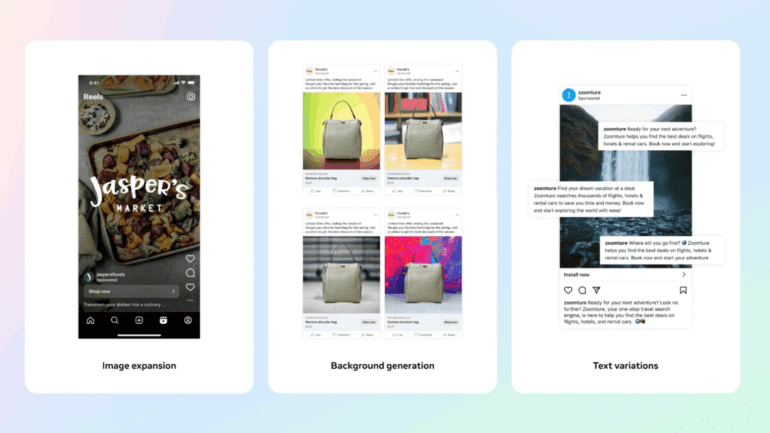TL;DR:
- Meta introduces generative AI features for advertisers.
- These tools enable personalized backgrounds, adaptable images, and diversified ad text.
- Advertisers using Advantage+ catalog benefit from simple background generation.
- Image expansion streamlines asset adaptation for various platforms.
- Text variations offer up to six distinct ad text versions, enhancing targeting.
- Preliminary trials indicate potential time savings and improved ad performance.
- Meta hints at future AI features, including tailored ad copy and backgrounds.
- Businesses can soon utilize AI for messaging on WhatsApp and Messenger.
Main AI News:
Meta, the tech giant, has taken a significant leap forward in its advertising capabilities with the introduction of groundbreaking generative AI features. These tools empower advertisers to harness the potential of artificial intelligence to revolutionize their ad campaigns. In a recent announcement, Meta showcased its commitment to innovation in advertising, following the highly anticipated Meta Connect event, where it unveiled its Quest 3 mixed-reality headset and a host of other generative AI products.
Meta’s foray into generative AI for advertising may not be as sensational as the celebrity AI counterparts that allow interactions with virtual personas like MrBeast or Paris Hilton. Nevertheless, it underscores Meta’s belief in the pivotal role of generative AI in assisting brands and businesses, which form the backbone of Meta’s revenue stream.
One of the three remarkable features introduced by Meta enables advertisers to personalize their creative assets by generating diverse backgrounds. These backgrounds can seamlessly transform the appearance of their product images. This functionality draws inspiration from Meta’s consumer-facing tool, Backdrop, which enables users to modify the backdrop or scene in their images through user-friendly prompts. In the context of advertising, these backgrounds are automatically generated based on the advertiser’s original product images, typically presenting as “simple backgrounds with colors and patterns.” This feature is exclusively available to advertisers utilizing Meta’s Advantage+ catalog for crafting their sales advertisements.
Another notable addition is the image expansion feature, which empowers advertisers to adapt their assets to various aspect ratios required across different platforms, such as Feed or Reels. Accessible to Advantage+ creatives within Meta’s Mads Manager, this AI-driven feature streamlines the process of repurposing creative assets, including images and videos, for various advertising surfaces.
The text variations feature within Meta Ads Manager is equally impressive, as it employs AI to generate up to six distinct versions of ad text based on the advertiser’s original copy. These variations are designed to emphasize specific keywords and input phrases desired by the advertiser. Advertisers can further fine-tune the generated text or select the most suitable option(s) aligned with their campaign objectives. During a campaign, Meta can dynamically display different combinations of text to different audiences, enabling real-time performance assessment. However, Meta currently consolidates performance data for these variations into a single ad. Nevertheless, advertisers can maximize their ad’s performance by running multiple options simultaneously.
Preliminary trials of these AI features with a diverse set of advertisers earlier this year have yielded promising results. Meta reports that generative AI can potentially save advertisers five or more hours per week, equating to a significant one-month gain annually. However, Meta acknowledges the ongoing efforts to further tailor the generative AI output to align seamlessly with each advertiser’s unique style.
Furthermore, Meta hints at a pipeline of additional AI features, including the creation of ad copy to highlight key selling points and the generation of backgrounds with tailored themes. Additionally, as announced during Meta Connect, businesses can look forward to utilizing AI for messaging on WhatsApp and Messenger, enhancing their capabilities for e-commerce, engagement, and customer support.
Conclusion:
Meta’s introduction of generative AI tools for advertisers represents a pivotal moment in the evolution of digital advertising. These innovative features promise to streamline the creative process, optimize ad performance, and set the stage for even more advanced AI-driven advertising solutions in the near future. As Meta continues to push the boundaries of technology, advertisers can expect to unlock new dimensions of creativity and efficiency in their campaigns.

